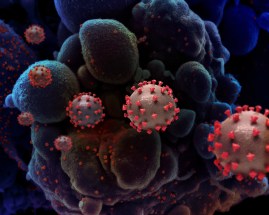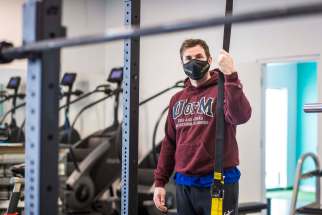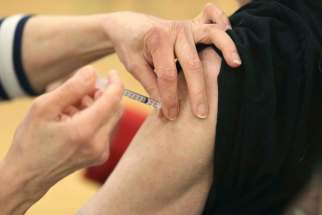Vaccination is key to COVID-19 fight
Read this article for free:
or
Already have an account? Log in here »
To continue reading, please subscribe:
Monthly Digital Subscription
$0 for the first 4 weeks*
- Enjoy unlimited reading on winnipegfreepress.com
- Read the E-Edition, our digital replica newspaper
- Access News Break, our award-winning app
- Play interactive puzzles
*No charge for 4 weeks then price increases to the regular rate of $19.00 plus GST every four weeks. Offer available to new and qualified returning subscribers only. Cancel any time.
Monthly Digital Subscription
$4.75/week*
- Enjoy unlimited reading on winnipegfreepress.com
- Read the E-Edition, our digital replica newspaper
- Access News Break, our award-winning app
- Play interactive puzzles
*Billed as $19 plus GST every four weeks. Cancel any time.
To continue reading, please subscribe:
Add Free Press access to your Brandon Sun subscription for only an additional
$1 for the first 4 weeks*
*Your next subscription payment will increase by $1.00 and you will be charged $16.99 plus GST for four weeks. After four weeks, your payment will increase to $23.99 plus GST every four weeks.
Read unlimited articles for free today:
or
Already have an account? Log in here »
Hey there, time traveller!
This article was published 13/04/2021 (1701 days ago), so information in it may no longer be current.
The COVID-19 pandemic is in a new and confusing phase. Through the tireless work of scientists, public-health officials and regulators at the national level, we are likely on a long downslope in deaths and possibly cases (a fourth wave notwithstanding). However, not much time has been spent considering what will happen once “herd immunity” has been achieved.
As a pediatrician with experience in encouraging vaccination, and an infectious disease doctor focused on critically ill adults, we are very concerned about the risks of vaccine hesitancy as the pandemic enters its terminal phase.
COVID-19 is still entrenched in Canadian communities, and we and other experts believe it is likely to persist in humans for the foreseeable future. A parade of new strains suggests COVID-19 may perpetually re-create itself, much like the influenza virus. And like the other common coronaviruses, it could become a childhood illness, thriving on the constant supply of non-immune children.
A parade of new strains suggests COVID-19 may perpetually re-create itself, much like the influenza virus. And like the other common coronaviruses, it could become a childhood illness, thriving on the constant supply of non-immune children.
As anyone who works with children knows, this means adults will always be at risk of contracting COVID-19. This scenario also means vaccinations are likely to become an ongoing effort, possibly with updated vaccines becoming regularly available.
Vaccine hesitancy is already a major concern. The Canadian Community Health Survey revealed that nearly one-quarter of Canadians over 12 years old expressed some vaccine hesitancy, and a full one-tenth of Canadians would outright refuse vaccination. Manitobans were about as hesitant as Canadians overall, although First Nations and Métis peoples had particularly high hesitancy. The most commonly cited concerns were vaccine safety and side effects.
It’s worth noting that this survey was conducted during the winter crest, when hospitals were overflowing. We expect vaccine enthusiasm will drop as high-risk people are vaccinated and deaths fade from the news. New variants from Brazil, South Africa and other regions could also discourage vaccination, as vaccines designed on the original COVID-19 strain will not work as well for new variants.
Our fear is that the public may perceive the vaccines as of only limited utility, even though they will still protect from life-threatening disease. New vaccines will arrive, but this is a mixed blessing: it is wonderful that vaccines can be quickly updated, but there is also a risk that people will delay getting vaccinated as they wait for more appealing options.
The AstraZeneca vaccine offers a real-time example. As physicians, we are encouraged by headlines announcing rapid regulatory adjustments being made around the world based on the rare occurrence of blood clots. While this risk needs to be thoroughly investigated, the vaccine should be recommended to groups at high risk from COVID-19 so long as this side effect is rare.
Our fear is that the public may perceive the vaccines as of only limited utility, even though they will still protect from life-threatening disease.
However, the public may see those same headlines and fear the vaccine was poorly designed or could be outright dangerous; the consequence is that some people will avoid this vaccine, hoping for another. Reduced visibility of the virus, a sense of helplessness regarding new virus variants and “vaccine shopping” may spur large numbers of people to delay or avoid vaccination altogether.
This would be precisely the wrong decision. When COVID-19 persists in our communities, vaccines are the only option to avoid life-threatening illness. There is no possibility of persistently avoiding the virus itself through herd immunity: adults who choose to delay vaccination are constantly at risk of getting sick with the virus, much like the common cold or influenza.
Although death rates have improved since the pandemic started, COVID-19 remains far more dangerous than anyone should accept, and it may worsen again as new variants become dominant.
We each have a decision to make: we can develop and maintain our COVID-19 immunity with vaccines, or we can eventually get the virus itself — and this scenario is likely to persist long after the pandemic has faded from the front pages. Much like wearing a seatbelt is always preferable in a car crash, being vaccinated is always safer than not being vaccinated, no matter the type of vaccine, the variant of COVID-19 or your personal age and health.
It is for this reason that we urge everyone to get vaccinated as soon as they are eligible, to take the vaccine that is offered, and to maintain their vaccination status as new virus variants and vaccines arrive.
We each have a decision to make: we can develop and maintain our COVID-19 immunity with vaccines, or we can eventually get the virus itself– and this scenario is likely to persist long after the pandemic has faded from the front pages.
Runjun Kumar is a resident physician in pediatrics and genetics at Baylor College of Medicine in Houston, Texas; Anand Kumar is a professor of medicine at the University of Manitoba.








